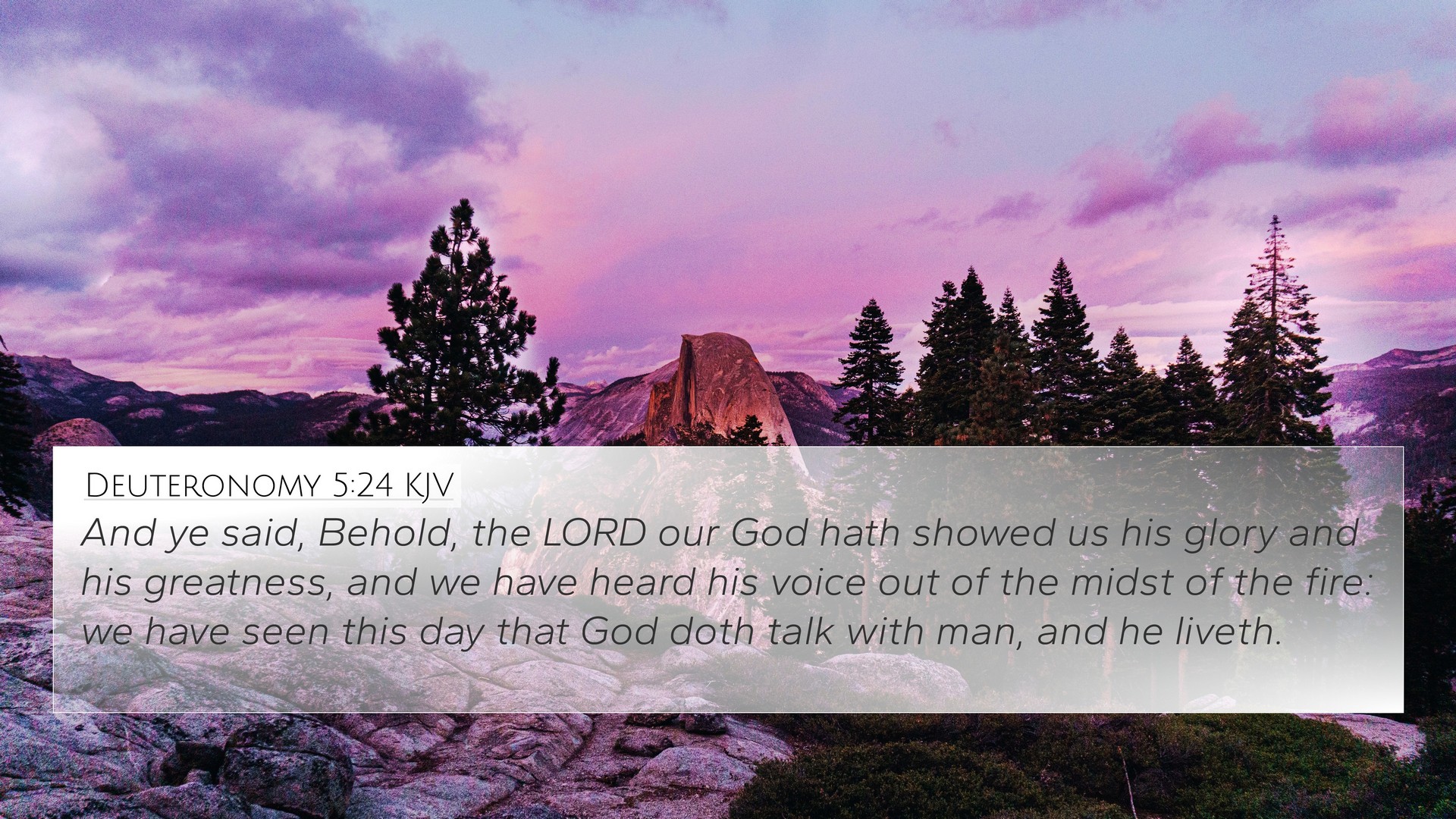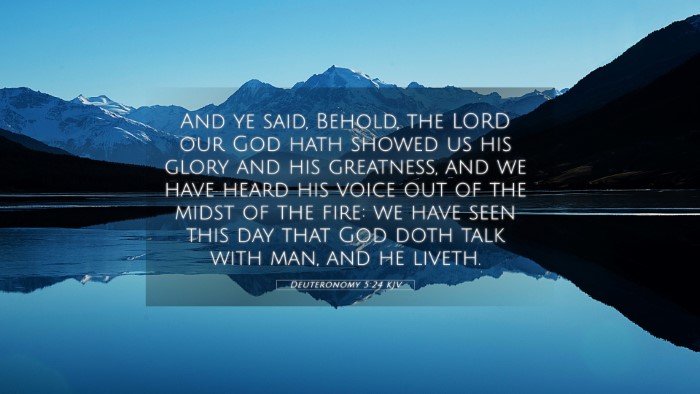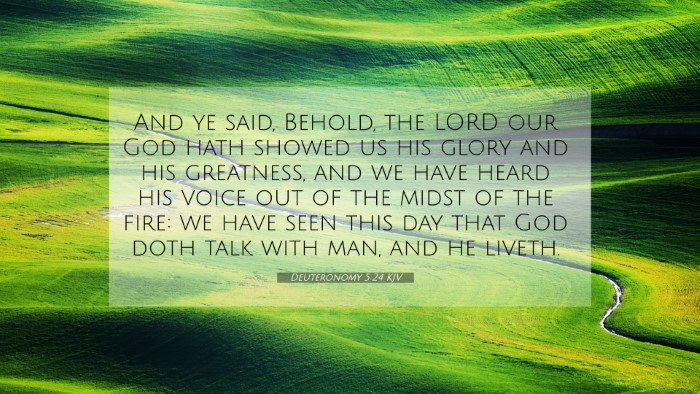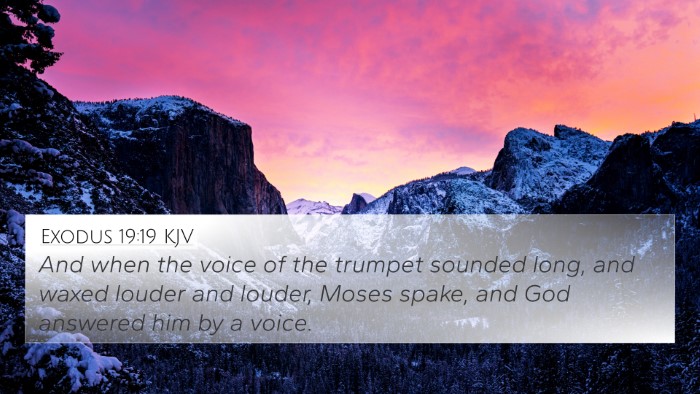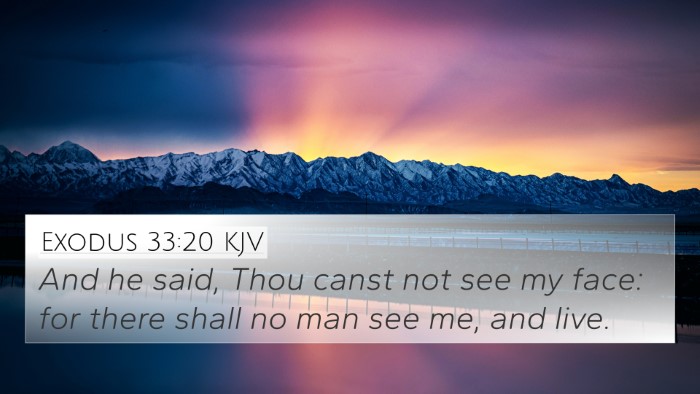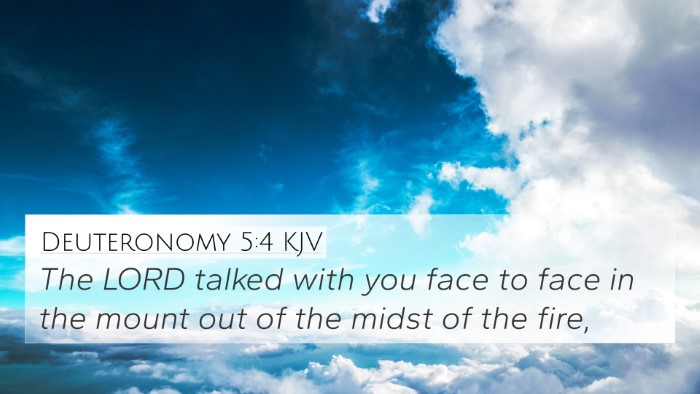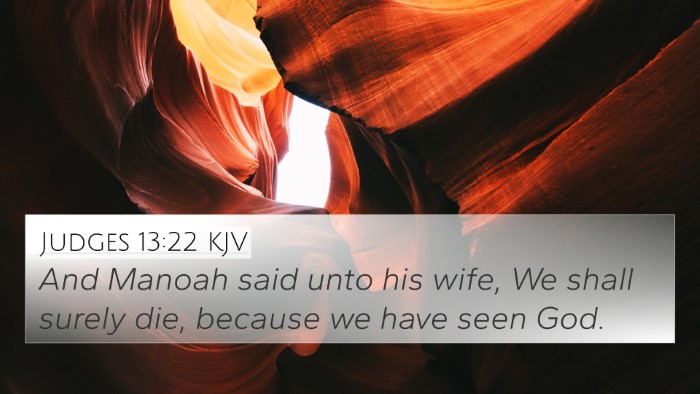Understanding Deuteronomy 5:24
Verse: "And you said, 'The LORD our God has shown us his glory and his majesty, and we have heard his voice from the fire; today we have seen that a man can live even if God speaks with him.'" (Deuteronomy 5:24, NIV)
Overview
This verse encapsulates the profound reverence the Israelites had towards God after witnessing His glory at Mount Sinai. It reflects on the direct encounters with divine majesty, highlighting their realization of God's holiness and their own mortality in His presence.
Insights from Public Domain Commentaries
Matthew Henry's Commentary
Henry emphasizes the awe and fear of God that characterized the Israelite experience. The declaration that they have seen His glory and heard His voice signifies a moment of divine revelation, meant to foster a fear of the LORD that leads to obedience. This verse illustrates the idea that human beings can interact with the divine, yet also acknowledges the serious consequences of such encounters.
Albert Barnes' Notes
Barnes notes that this experience serves as a confirmation of God’s covenant with Israel. The recognition of God's voice emerging from the fire symbolizes His engaging presence and power. Barnes asserts that the statement made by the people reflects a theological understanding that cannot be ignored: the seriousness of living in a covenant relationship with such a powerful God.
Adam Clarke's Commentary
Clarke interprets this verse in the context of covenant and relationship. He suggests that hearing God’s voice is a privilege that distinguishes Israel among nations. The fears expressed reveal human vulnerability; nevertheless, it also represents hope as God desires a relationship with His people. Clarke's exegesis invites readers to consider how God communicates with believers throughout the ages.
Theological Significance
- God's Holiness: The fire represents the purity of God, underscoring the notion that He is both transcendent and immanent.
- Human Inadequacy: The verse illustrates that while God is accessible, His holiness highlights human limitations, calling for reverence and obedience.
- Covenantal Relationship: Understanding this verse requires recognizing Israel's unique status as God's chosen people within the covenant framework established by God himself.
- Divine Communication: The mention of hearing God reveals a critical aspect of the believer's experience—God speaks to His people.
Cross-References
To fully understand the implications of Deuteronomy 5:24, consider the following cross-references:
- Exodus 19:16-19: The dramatic revelation of God on Mount Sinai, paralleling the ideas of glory and majesty.
- 1 Timothy 6:16: Acknowledges God as dwelling in unapproachable light, reinforcing the theme of divine holiness.
- Hebrews 12:28-29: Invites believers to appreciate their access to God amidst reverence, resonating with the fear exhibited in Deuteronomy.
- Isaiah 6:1-5: Prophet Isaiah's experience conveys a similar awe before God's glory.
- Moses’ Encounter in Exodus 3:4-5: God calls Moses from a burning bush, a dramatic illustration of God's call through fearful yet holy means.
- Psalm 46:10: Highlights the peace and presence of God amidst tumult, inviting contemplation on divine encounter.
- John 1:14: "The Word became flesh and made his dwelling among us," reflecting the ultimate revelation of God's glory through Christ.
Exploring Connections
Deuteronomy 5:24 creates dynamic connections between various biblical texts:
- Connections between the Old and New Testament: The glory of God shown to Israel parallels the revelation of Christ's glory in the New Testament.
- Bible verses that relate to each other: The fear and reverence shown in this verse finds echoes in the teaching of Christ (e.g., Matthew 10:28).
- Thematic Bible verse connections: The themes of fear of God, reverence, and divine revelation resonate through many scriptures, knitting a cohesive theological tapestry.
- Inter-Biblical dialogue: This verse engages a conversation regarding the nature of God’s presence, influencing entire books of wisdom literature and the New Testament writings.
Applying Biblical Cross-Referencing Tools
As readers explore these connections, various tools for Bible cross-referencing enhance understanding:
- Bible concordance: A comprehensive index for locating terms and concepts across scriptures.
- Bible cross-reference guide: Offers multi-faceted insights into scriptural parallels.
- Cross-reference Bible study: Encourages a deeper study methodology for holistic scriptural reading.
- Bible chain references: Aids in tracing themes through connections across different books of the Bible.
Conclusion
Deuteronomy 5:24 presents a layered understanding of humanity’s relationship with God through the lens of divine reverence and communication. The insights from commentaries illuminate the contextual significance while the cross-references deepen the reader's engagement with the scripture. As we link various biblical texts, we witness a rich tapestry woven through both the Old and New Testaments, inviting believers into a process of reflection, reverence, and relationship with the divine.
